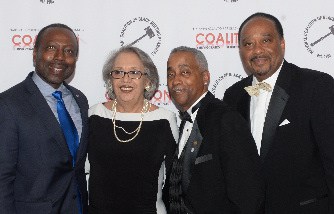Antigua and Barbuda, Argentina, Brazil, Costa Rica, Ecuador, and Uruguay sign the conventions against racism and discrimination
WASHINGTON, DC –
Antigua and Barbuda, Argentina, Brazil, Costa Rica, Ecuador, and Uruguay today became the first signatories of the “Inter-American Convention against Racism, Racial Discrimination, and Related Forms of Intolerance” and the “Inter-American Convention against All Forms of Discrimination and Intolerance,” adopted yesterday at the forty-third regular session of the General Assembly of the Organization of American States (OAS).
The foreign ministers of Argentina, Brazil, Costa Rica, and Ecuador, the vice foreign minister of Uruguay, and the Permanent Representative to the OAS of Antigua and Barbuda signed the document in Antigua, Guatemala, in the presence of the Secretary General and Assistant Secretary General of the OAS. In order for both conventions to take effect, they must be ratified by the congresses of two signatory countries.
In the words of Secretary General Insulza, “the principal merits” of the Inter-American Convention against Racism, Racial Discrimination, and Related Forms of Intolerance “are to reaffirm, update, and improve upon some of the notions enshrined in the 1965 UN International Convention on the Elimination of All Forms of Racial Discrimination, strengthening and specifying for the Americas the democratic content of the principles of equality before the law and nondiscrimination.”
The head of the OAS stressed that the “hemispheric instrument develops a legally binding definition of racism, multiple or aggravated discrimination, and intolerance; and proposes to protect all human beings against racism, racial discrimination, and related forms of intolerance in any area of public or private life, among other contributions.”
As for the Inter-American Convention against All Forms of Discrimination and Intolerance, Secretary General Insulza said it has “great symbolic and juridical value” and “makes the OAS an international organization at the vanguard of the fight against all forms of discrimination and intolerance.”
This is the first legally binding instrument, explained the Secretary General, that condemns discrimination “by reason of nationality, age, sex, sexual orientation, gender identity or expression, language, religion, cultural identity, political or other opinion, social origin, socioeconomic position, level of education, migration status, status of refugee or repatriated, stateless, or internally displaced person, disability, genetic characteristic, mental or physical health status, including infectious or contagious disease status, or psychologically disabling condition, or for any other reason.”
The Minister of Foreign Affairs and Worship of Argentina, Héctor Timerman, said his country “celebrates the continuing role of the OAS as a forum for dialogue and consensus to allow progressive development of human rights protection, creating new juridical instruments on issues vital to the region, such as these two conventions we are signing today.” The Argentine foreign minister encouraged the rest of the countries of the Hemisphere to sign “all the region’s juridical instruments on human rights to bring about fully universal adoption.”
The Minister of Foreign Affairs and Worship of Costa Rica, Enrique Castillo Barrantes, said “we are very pleased at the signing of these instruments because we have worked since their inception as promoters and drafters of the conventions. The effort culminates today and we believe this is a positive contribution to the functioning of the inter-American system.”
The Minister of Foreign Affairs of Ecuador, Ricardo Patiño, said that “Ecuador, faithful to its Constitución, joins in signing these conventions and urges the rest of the countries of our Hemisphere to do the same.”
The Permanent Representative of Uruguay to the OAS, Milton Romani, said that “for Uruguay this signifies a major enhancement of rights and of efforts against all forms of discrimination. Our country has already voted in a marriage equality law recognizing these rights, so Uruguay has even more reason to support these conventions.” The vice foreign minister of Uruguay, Luis Porto, signed both the conventions.
The Permanent Representative of Antigua and Barbuda, Deborah-Mae Lovell, whose country played a key role in the negotiations that brought about consensus leading to adoption of the texts of both conventions, emphasized her country’s commitment to “those who have no voice” and recalled the work of her compatriot, the former President of the Inter-American Commission on Human Rights, Sir Clare Roberts, “as a long-term promoter of the rights of persons of African descent in the Hemisphere.”
The Alternate Representative of Antigua and Barbuda, Joy-Dee Davis Lake, who chaired the Permanent Council working group that concluded the negotiations on the two texts, said the spirit of the documents “stems from the capacity to realize the promises of democracy, such as justice, equality, and the pursuit of happiness.”




